Key takeaways
- Understanding candidates’ backgrounds and community engagement helps gauge their dedication and effectiveness.
- Researching candidates’ policy positions and voting records provides insight into their true priorities and values.
- Attending community forums and town hall meetings builds trust and fosters personal connections with candidates.
- Engaging with diverse perspectives, such as friends and local news, enriches the understanding of candidates’ reputations and proposals.
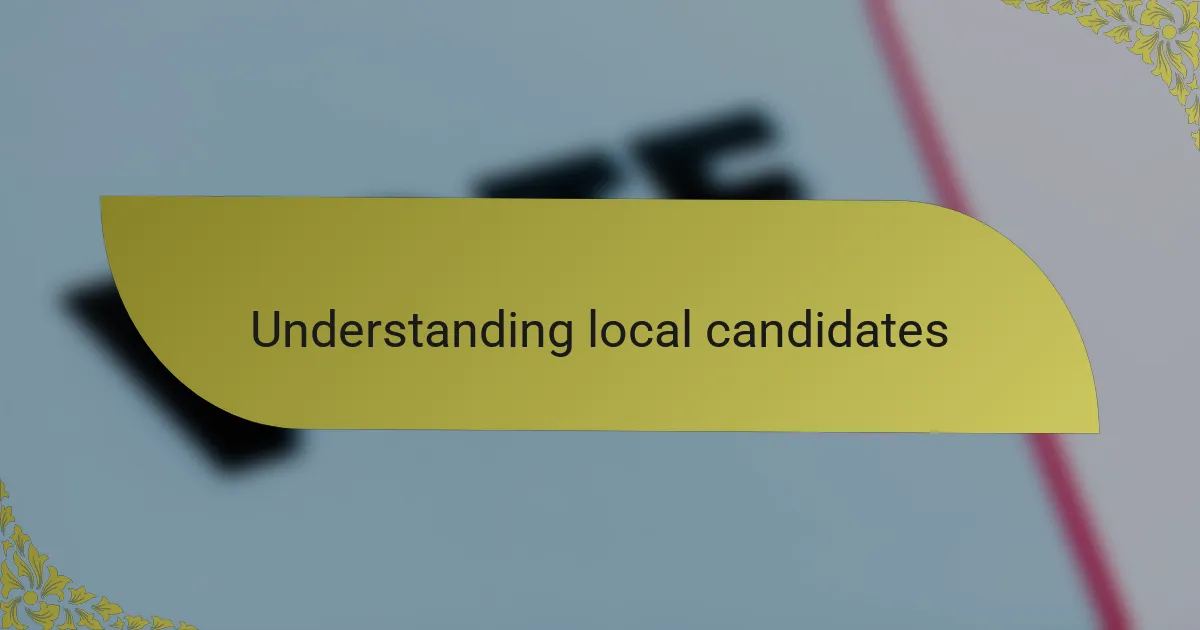
Understanding local candidates
When I set out to understand local candidates, I realized it’s more than just scanning their websites or looking at their social media. I remember attending a community forum where candidates presented their platforms directly to us. That experience really opened my eyes to the personal stories and motivations behind each candidate. It’s interesting how seeing them speak live added a layer of trust—body language and genuine passion matter.
Here are key aspects I focused on during my research:
- Background and Experience: What kind of work have they done before running for office? Understanding their history helps gauge their capability.
- Community Engagement: How have they interacted with the community? Local involvement is often a sign of dedication.
- Policy Positions: What are their stances on critical local issues? I found digging into their policy proposals crucial for determining alignment with my values.
- Public Perception: Who supports them, and what do constituents say? Local opinions can provide deeper insights.
- Past Performance: If they’ve held office before, how did they perform? Reviewing their track record can indicate their effectiveness.
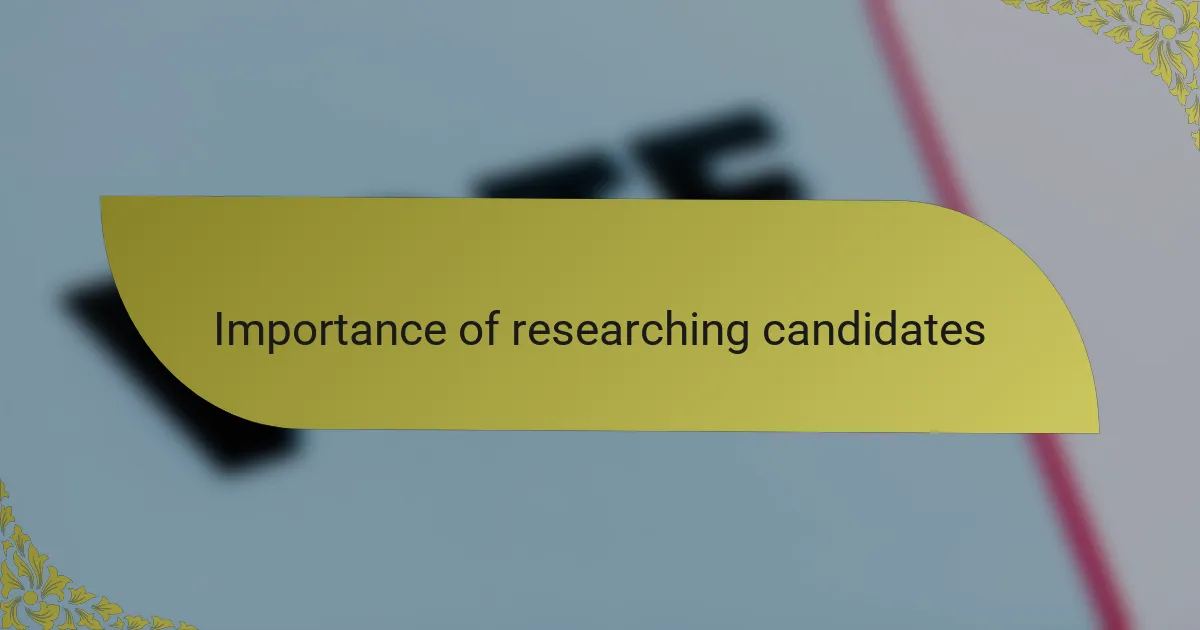
Importance of researching candidates
Researching local candidates is crucial for making informed decisions that impact our communities. I remember when I first voted; I felt overwhelmed by the number of candidates and their promises. Taking the time to learn about their backgrounds, values, and track records helped me feel confident in my choices.
It’s essential to understand that not all candidates are created equal. Here are some reasons why researching candidates is so important:
- Informed Choices: Knowledgeable voters can distinguish between genuine candidates and those with questionable motives.
- Community Impact: Local candidates affect vital areas such as education, infrastructure, and public safety, ultimately shaping our daily lives.
- Accountability: A well-researched voter holds elected officials accountable, making them more likely to fulfill their promises.
- Empowerment: Knowing the candidates instills a sense of empowerment, encouraging active participation in the democratic process.
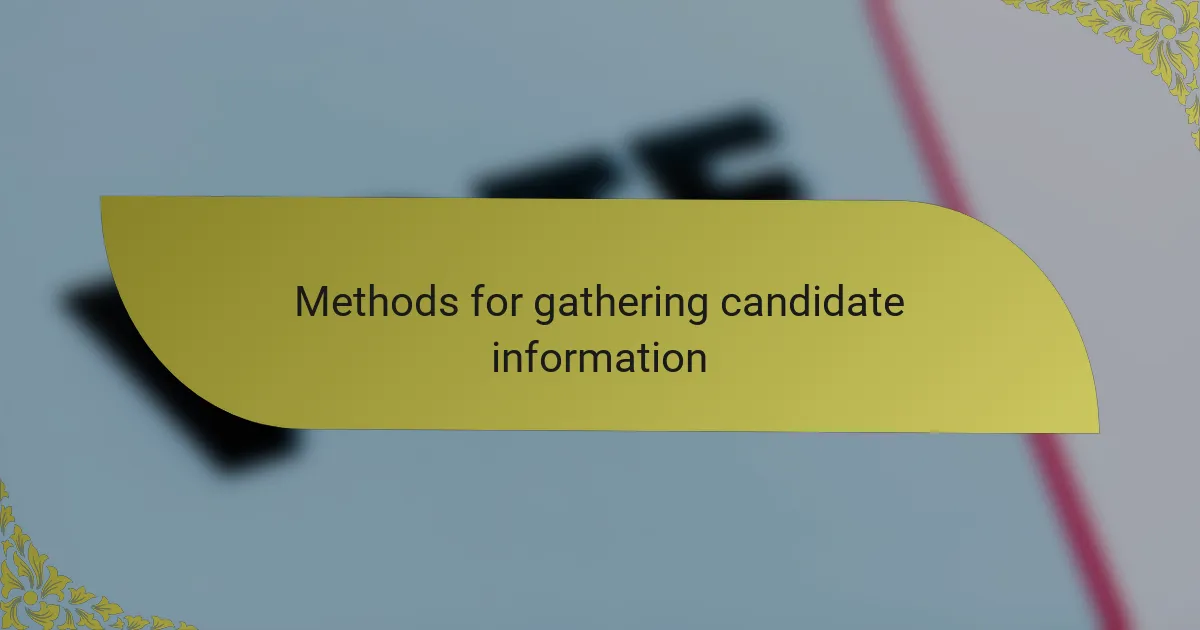
Methods for gathering candidate information
When I set out to gather information about local candidates, I leaned heavily on multiple methods. One of my favorites was using online resources, such as candidates’ official websites and social media profiles, to get a sense of their platforms and promises. I found it enlightening to see how they presented themselves and connected with voters. Additionally, attending town hall meetings provided a firsthand experience of how candidates interact with the community, which really added depth to my understanding.
I also utilized local news articles and opinion pieces, which often highlighted different perspectives on the candidates. Reading between the lines of these sources helped me gauge not just the candidates’ positions but also their reputations locally. Engaging with friends and family about their views created a rich dialogue where I’d often discover insights I hadn’t considered before.
In comparison, the table below summarizes different methods I found helpful and their pros and cons:
| Method | Pros and Cons |
|---|---|
| Online Resources | Pros: Easy access, comprehensive info; Cons: May be biased based on source |
| Town Hall Meetings | Pros: Personal interaction, real-time feedback; Cons: Time-consuming, limited to local events |
| Local News Articles | Pros: Varied insights, expert opinions; Cons: Possible bias from journalist’s perspective |
| Conversations | Pros: Diverse viewpoints, relatability; Cons: Can reflect personal biases |

Evaluating candidate platforms
Evaluating a candidate’s platform can feel like unraveling a complex puzzle, especially with the myriad of issues at stake. I remember sifting through policy documents and proposals, trying to understand how each candidate’s stance aligned with my own values. It’s not just about what they say, but how they present their plans. Are they clear and actionable? Vague promises can often signal a lack of genuine commitment.
As I dove deeper, I was struck by the importance of their specific policy positions on local issues like education and healthcare. For instance, when a candidate addressed how they would improve local schools, I found myself reflecting on my own experiences in the education system. Did their proposals seem practical or overly ambitious? This introspection helped me evaluate not just their plans, but also their understanding of our community’s needs.
Moreover, observing the support each candidate garnered—who stood behind them, and what endorsements they received—was eye-opening. I often asked myself, what does this say about their credibility? It’s fascinating how public perceptions can shed light on a candidate’s ability to connect with constituents. In my research, I realized that a candidate’s platform isn’t just a list of policies; it’s a reflection of their commitment and understanding of the community they aim to serve.
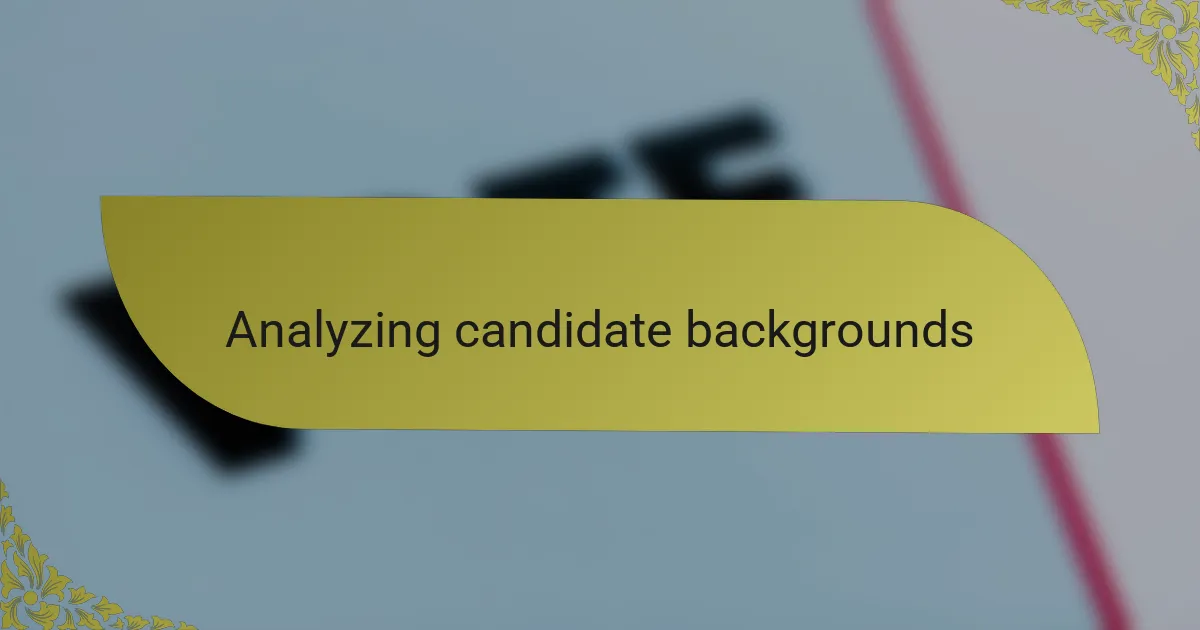
Analyzing candidate backgrounds
When analyzing candidate backgrounds, I dive deep into their professional histories, educational qualifications, and past political experiences. I remember the first time I researched a candidate for local office; I found their college thesis online, which surprisingly revealed a lot about their values and priorities. It emphasized for me how important it is to look beyond just the campaign speeches to understand who these individuals truly are.
Moreover, verifying candidates’ claims and learning about their community involvement provides essential context about their motivations and credibility. I always make it a point to check their voting records and any public statements they’ve made. Here’s what I focus on during my analysis:
- Educational background and qualifications
- Previous political positions held
- Key policy positions and campaign platforms
- Community engagement and volunteer history
- Voting records and public statements
- Media coverage and controversies, if any
In my experience, it’s this well-rounded view that helps voters make informed decisions.
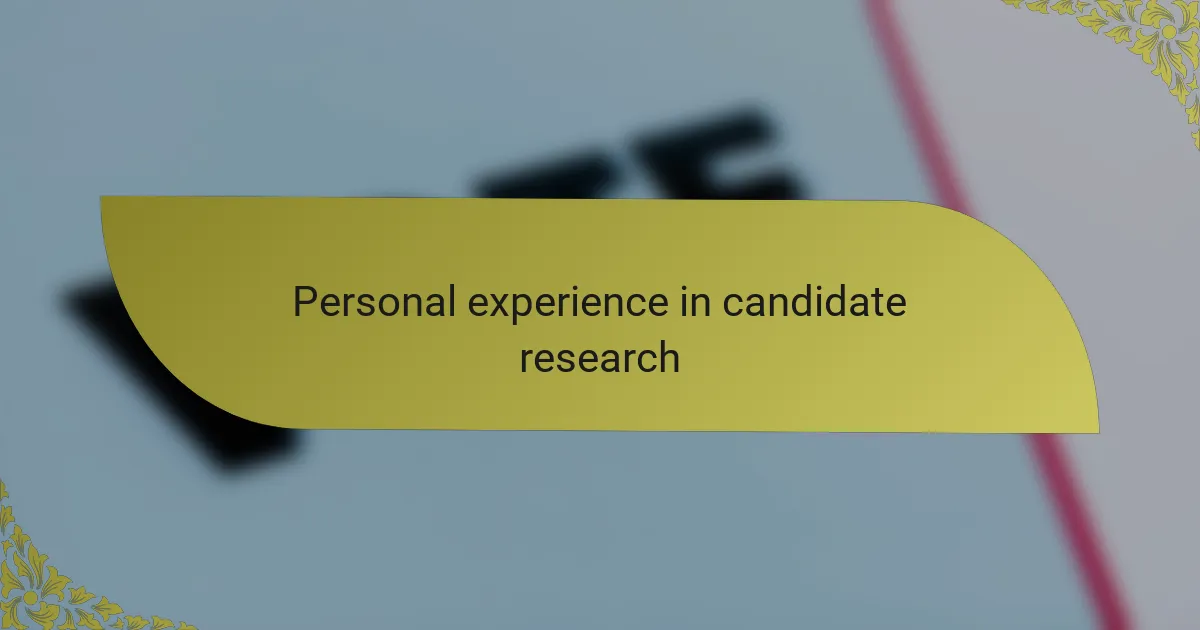
Personal experience in candidate research
In my journey of researching local candidates, I quickly learned that their backgrounds tell a compelling story. I remember poring over one candidate’s previous work in community service, which deeply resonated with me. It made me wonder, how often do voters miss these vital details? Understanding where a candidate has come from can illuminate their motivations and values, and it’s essential to connect those dots when making a choice.
I also found that examining community engagement was a pivotal part of my research. There was a candidate who had consistently volunteered at local shelters, and hearing personal stories from community members about the impact of their work really reinforced my impression of them. It made me think: how engaged do I want my elected officials to be? That question guided my choices and steered me toward candidates who genuinely understand and support our community’s needs.
Another significant aspect was dissecting policy positions. I vividly remember a debate where candidates articulated their visions for healthcare. One candidate’s approach felt particularly aligned with my values because they shared relatable anecdotes about real families struggling with health issues. In that moment, I realized how vital it is for candidates to connect their policies with human experiences. Does this resonate with you? The ability to relate issues to everyday life can often be the deciding factor when casting my vote.
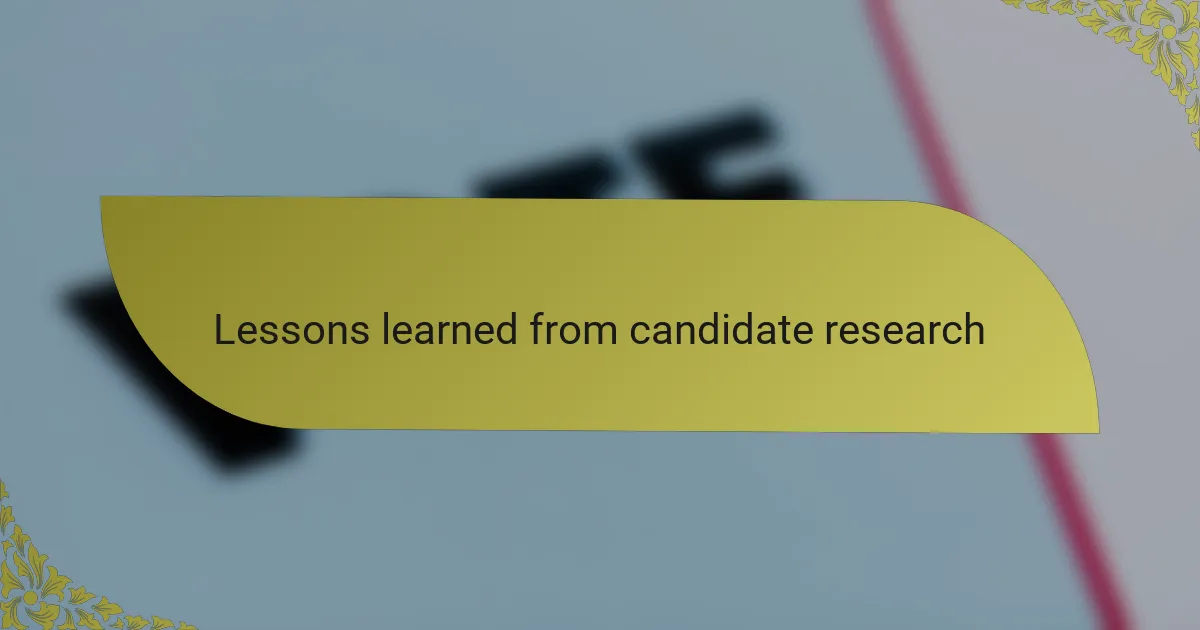
Lessons learned from candidate research
When I researched local candidates, I realized how important it is to look beyond just their campaign slogans. For instance, I found that checking their voting history and public statements often revealed a more nuanced picture of their priorities. This effort not only made me feel more informed but also more confident in my choices—I wasn’t just picking a name; I was supporting a vision.
One lesson that stood out was the necessity of understanding local issues from multiple angles. Engaging with community events and talking to constituents brought insights that no website could provide. This personal connection made the whole process more rewarding, reinforcing how politics affects real lives.
Here’s a comparison of what I learned during my research:
| Research Method | Impact on Decision |
|---|---|
| Reviewing Voting Records | Gave insight into candidate’s priorities |
| Attending Town Halls | Fostered personal connection and trust |
| Engaging with Community Groups | Highlighted real issues affecting residents |